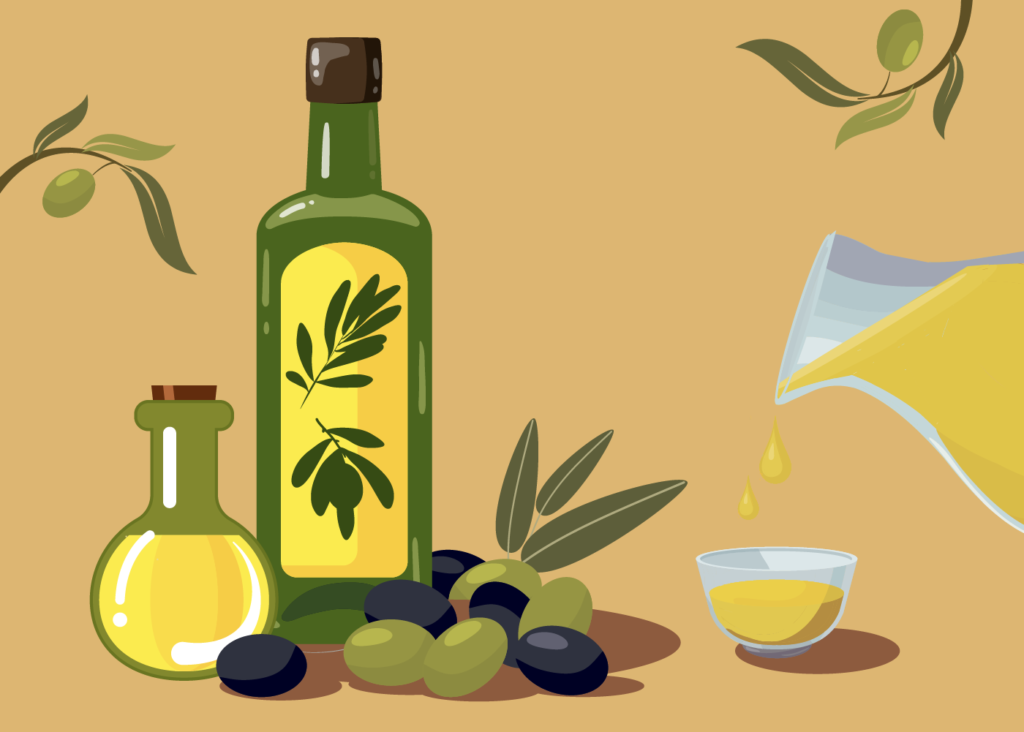Once called the “gift from the Gods”, olive oil is well-loved for its anti-inflammatory 1 and antioxidant 2 properties, and has since become a pantry staple in many households. With its many health benefits, some people also believe that olive oil can also ease the passage of kidney stones. However, prior research suggests that olive oil and its alleged stones-passing properties are merely a myth.
What is olive oil?
Olive oil is an edible, natural product derived from fruits of the olive tree, also known as Olea Europaea. Multiple studies have shown that olive oil intake can reduce lipid and DNA oxidation, lower blood pressure, and is protective against cardiovascular and metabolic conditions.
Why do people believe that olive oil can help with passing kidney stones?
As olive oil is relatively thick and lubricative in nature, some people believe that drinking large amounts of olive oil will help to lubricate their kidney stones and urinary tract. The belief is that, by reducing friction between the kidney stone and the urinary tract, olive oil will help to ensure a smoother, and relatively less painful stone passing experience.
Can olive oil make it easier for me to pass my kidney stone?
No. When you consume olive oil – or any foods, for that matter, it is broken down by your digestive system, into smaller components. Olive oil is digested into fatty acids and triacylclycerols4, and will no longer take on the form of a thick lubricant4. As such, there’s no way that olive oil can help to slide your kidney stones out of your urinary tract!
Are there any other ways that olive oil can be good for my kidney stones?
Unfortunately, no human studies have confirmed any therapeutic effects of olive oil on kidneys and kidney stones.
In 2017, researchers found that consuming 1.7ml/kg of olive oil helped to reduce and prevent the growth of kidney stones in albino mice. They suggested that it could be due to the antioxidant properties of olive oil, and its effect on urinary oxalate, calcium and phosphate5.
However, animal studies can be poor predictors of human bodily reactions due to a range of factors, such as animals having different metabolic pathways6 as compared to humans. That’s why human clinical studies are important, and these findings do not mean that you should be consuming olive oil to prevent kidney stones!
In Summary
Olive oil can be great for your metabolic and heart health, but there has been no proven benefits on kidney health and kidney stones. If you’re struggling to pass a kidney stone naturally, we recommend reaching out to your urologist for further treatment options and keeping to the basics of staying well-hydrated, instead of relying on olive oil!
Sources:
-
Lucas, L., Russell, A., & Keast, R. (2011). Molecular mechanisms of inflammation. anti-inflammatory benefits of virgin olive oil and the phenolic compound oleocanthal. Current pharmaceutical design. Retrieved June 6, 2022, from https://pubmed.ncbi.nlm.nih.gov/21443487/
-
Lanza, B., & Ninfali, P. (2020, January 2). Antioxidants in extra virgin olive oil and table olives: Connections between agriculture and processing for health choices. Antioxidants (Basel, Switzerland). Retrieved June 6, 2022, from https://www.ncbi.nlm.nih.gov/pmc/articles/PMC7023406/
-
Buckland, G., & Gonzalez, C. A. (2015, April). The role of olive oil in disease prevention: A focus on the recent epidemiological evidence from cohort studies and dietary intervention trials. The British journal of nutrition. Retrieved June 6, 2022, from https://pubmed.ncbi.nlm.nih.gov/26148926/
-
Libretexts. (2020, May 31). 5.4: Digestion and absorption of lipids. Medicine LibreTexts. Retrieved June 6, 2022, from https://med.libretexts.org/Bookshelves/Nutrition/Book
-
Alenzi, M., Rahiman, S., & Tantry, B. A. (2017, May). Antiurolithic effect of olive oil in a mouse model of ethylene glycol-induced urolithiasis. Investigative and clinical urology. Retrieved June 6, 2022, from https://www.ncbi.nlm.nih.gov/pmc/articles/PMC5419107/
-
Bracken, M. B. (2009, March). Why animal studies are often poor predictors of human reactions to exposure. Journal of the Royal Society of Medicine. Retrieved June 6, 2022, from https://www.ncbi.nlm.nih.gov/pmc/articles/PMC2746847/





